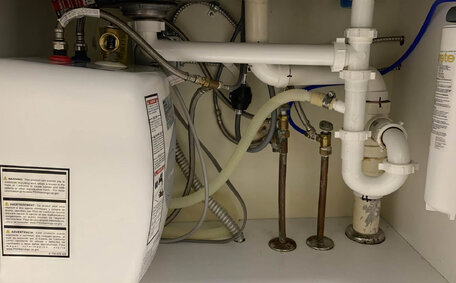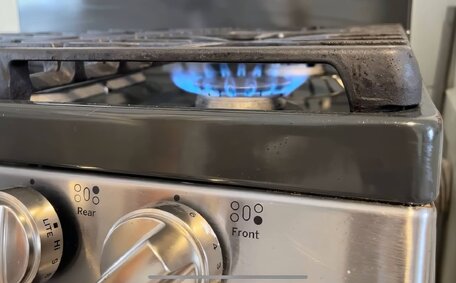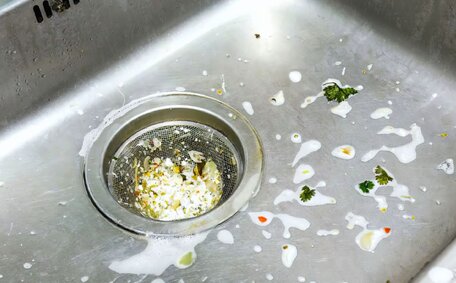Introduction to the dangers of gas leaks
A gas leak near you presents significant health and safety risks. Small leaks of natural gas or LPG from appliances such as open-flued heaters can present significant risks of fire, explosion, and poisoning. Prompt detection and response are crucial to prevent hazards.
Exposure to unflued gas and its toxic by-products can result in symptoms including headaches, nausea, confusion, and dizziness, particularly with gas cooking appliances. Given that natural gas is odourless and colourless, using gas stoves poses a hazard as leaks may go unnoticed, risking poisoning.
This article will cover everything homeowners need to know to stay safe from a potential natural gas leak in your house.
Identifying signs of a household gas leak
Several signs can alert you to a gas leak in your home:
- Rotten egg smell - Household natural gas contains an added odorant that emits a distinct rotten egg smell to aid leak detection.
- Hissing sound, whistling, or roaring - Gas escaping from pipes or appliances can create loud noises.
- discolouration or wilting of plants or grass - Faulty gas equipment leaks kill vegetation.
- Flames near the ground or appliances - This signals burning gas escaping equipment.
- Dirt blowing from a hole in the ground - Gas leaks can displace soil.
- Bubbling in water-soaked areas on the ground - Escaping gas may form bubbles in water-soaked areas.
- Unusual moisture inside windows - This may occur with gas heating systems like unflued indoor gas appliances when furnaces leak.
- Pilot lights extinguishing often - This common sign points to a leak near the appliance.
- Foggy or condensed windows - Leaking gas appliances create moisture droplets.
Act promptly upon discovering gas leak indicators. Leave the area immediately and contact gas companies or emergency services from outside your home.
Health impacts of gas leak exposure
Exposure to natural gas leaks can have serious impacts on human health and the well-being of residents in your home. One significant risk from gas appliance use is the difficulty in detecting leaking fumes, which can reduce atmospheric oxygen levels and impair body tissue oxygenation.
A natural gas leak in your home can introduce low levels of carbon monoxide. Low-level carbon monoxide exposure may result in headaches, dizziness, weakness, and nausea.
Odourless and invisible carbon monoxide binds to haemoglobin, limiting oxygen transport.
Symptoms from frequent use of gas appliances and resulting air pollutants may also include:
- Fatigue
- Chest pain or tightness
- Visual changes
- Unusual behaviours
- Skin redness or blisters (from ignition/explosion)
The nervous system, vulnerable to injury, may sustain irreversible harm like brain damage, paralysis, or seizures. Prolonged exposure to low levels of gas can increase the risk of developing cancers, anaemia, respiratory issues, heart disease, and mental health challenges.
Poor indoor air quality from a gas leak during pregnancy can cause miscarriage or birth defects. Infants and small children are more than susceptible to gas poisoning and its neurological effects.
If you suspect gas leak in your vicinity, leave the area immediately. Seek medical attention immediately at your local clinic if you suspect gas leak your exposure symptoms, even if they seem mild. Be sure to mention the possibility of having been exposed natural gas symptoms, as specialised testing may identify the presence of toxic gases in the body.
Carbon monoxide poisoning
The risks of exposure to carbon monoxide CO, which can be lethal, deserve special concern when gas leaks occur. This toxic gas is invisible, odourless, tasteless and initially undetectable without a CO detector. It bonds to red blood cells at even low concentrations, preventing oxygen transport in the body.
Low levels of exposure to carbon monoxide (CO) can lead to flu-like symptoms gas such as headaches, dizziness, weakness, nausea and fatigue. More severe symptoms include confusion, seizures, loss of consciousness and even coma or death from exposure carbon monoxide. Fatalities often happen as level carbon monoxide can build up during prolonged exposure while sleeping, with early symptoms easily going unnoticed.
Take decisive action on gas safety if your gas heaters aren’t working as per your local gas company’s guidelines.
Check batteries every month and replace as per the manufacturer’s instructions, at least every 5 years. Be aware that CO detectors don’t safeguard against other dangerous combustion products produced in leaks. CO detectors should be installed on every floor of homes, especially near bedrooms.
If an alarm sounds, evacuate immediately and immediately call your local fire department or gas emergency services on 000, especially if you notice a leak in your home. Seek medical help even if symptoms of gas exposure in your home seem minor, as they can rapidly escalate once clear of exposure. Inform first responders about the possibility of CO poisoning from your gas heater so testing can be promptly conducted.
Other short and long-term health effects
Gas leak exposure can result in chronic health issues beyond the initial symptoms. Even after initial exposure, residual toxins can continue to harm bodily tissues and organs.
Headaches, fatigue, nausea, and respiratory issues are common after exposure. More severe cases can result in ongoing neurological or cognitive dysfunctions like memory and concentration difficulties, mood disorders or motor impairment.
Studies also indicate elevated health risks, including long-term risks of certain cancers, reproductive health disorders, vision loss, liver and kidney damage following significant gas exposure incidents. Children are particularly vulnerable to gas exposure due to their developing bodies and brains.
The latent, term effects make it critical to have complete medical exams after any leak, not just when symptoms manifest initially. Be sure to disclose the gas leak event so doctors can assess potential repercussions and order appropriate screenings, considering both short-term and long-term effects.
Responding to a gas leak appropriately
If you suspect a gas leak in your home, it’s crucial to act quickly and appropriately to protect health and safety:
- Evacuate immediately - Evacuate everyone, including pets, from the building. Turn off all lights, appliances and avoid using your car to prevent sparks that could compromise safety.
- Call 000 - Emergency services will despatch gas technicians and other personnel to assess your gas lines and perform gas line repair while evaluating potential dangers.
- Do not re-enter - Wait for official clearance before going back inside, even after the gas is turned off gas. Lingering fumes still pose risks.
- Notify your gas provider - Call the number on your meter’s latest gas bill so they can send technicians for line repair and inspect equipment.
- Allow ample ventilation - When officials deem it safe to re-occupy, open doors and windows to let in fresh air and ventilate all spaces before using appliances.
- Have a thorough inspection - Only use equipment again after a licenced technician has examined the entire gas system and made necessary repairs.
- See a doctor - Even if you feel fine, get medical attention to check for toxic exposure effects, now and over time.
Maintaining gas safety is essential for ensuring a PSE healthy living environment, so every instance where there’s a gas leak need to be addressed as an emergency situation. Never hesitate to call an emergency plumber or emergency services when asking about your gas heaters’ functionality, or detecting signs of a leak or exposure. Safety must be the top priority for both immediate public health wellbeing and long-term health.
Preventing and detecting household gas leaks
When comes matters of safety, it starts with preventing gas leaks through proper installation and regular maintenance of gas appliances and pipelines by licenced professionals.
Have all your gas appliances inspected annually, or as specified by manufacturers. Monitor expiration dates on flexible appliance connectors to help prevent gas leaks in your home. Follow essential safety tips such as installing carbon monoxide alarms on all levels of homes.
Remain alert for gas leak signs like the smell of rotten eggs or frequently extinguishing pilot lights. Inspect your gas system before use if nearby plumbing work occurs or after an earthquake. Check that outdoor vents and chimney flues are clear of debris, snow, and pests.
Always engage a qualified gas fitter for installing or relocating appliances.
Replace old or damaged gas hot water heater units before problems arise to prevent unexpected issues.
We encourage you to visit our website for detailed information on gas plumbing, safe installations, leak detection, and repairs of pipes or appliances. Our fully certified gas plumber team adheres to all Australian standards, codes andbest practises to safeguard your family and home.






